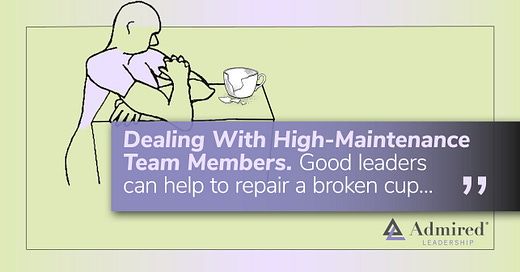Some team members are needy.
They seem to always demand another conversation, more clarity regarding the process, and the time to explain how they are engaged with their work. They are often relentless in their desire for a leader’s attention. For the leader, this takes up an enormous amount of time and energy, much of which is not very productive.
Even more frustrating is the fact that when leaders placate high-maintenance team members, those individuals want even more from the leader.
It's like these team members have a crack in the cup of self-confidence and personal validation. Whatever the leader pours into the cup, it just leaks out of the crack, demanding even more time and attention with no end in sight.
So what should a good leader do?
Ignoring or limiting the time a leader gives the needy colleague typically makes the situation worse. The more a high-maintenance team member feels isolated or without an outlet for their need to discuss issues, the needier they become. When leaders dodge the needy colleague, they commonly turn to teammates for support and drive others to distraction.
In fact, good leaders ask the team not to allow the needy colleague to chew up their time with frivolous conversations. Leaders tell everyone this is their issue to resolve.
The best approach is to engage the needs of high maintenance colleague head-on without encouraging them. The first step is to raise their awareness by discussing that others on the team don’t need the same assurances or conversations they do. Exploring the reason for this difference helps them to understand the need to set boundaries around what is acceptable and unacceptable behavior.
Next, good leaders ask the high-maintenance team member to engage them at set times each week. Limiting the time allotted and scheduling these conversations highlights that boundaries are essential and must be honored.
Weekly check-ins likely won’t fully satisfy the needy colleague, so it is a good idea to ask them to seek out an additional outlet for the conversations not connected to the team. A family member or friend might be suggested.
In more extreme circumstances, a psychologist or therapist would be a better suggestion. This advice once again emphasizes that boundaries must be observed.
Lastly, it makes good sense to put a plan in place to address the concerns of the high-maintenance colleague. For example, a team member of low confidence who needs assurances might be asked to collect specific feedback on a regular basis, or a colleague who desires to debrief after every meeting might be requested to summarize meetings in writing and then submit a set of questions to the leader regarding what they want to know or discuss.
Leading a high-maintenance colleague is rarely fun or easy. But with a skillful appeal of setting clear boundaries, good leaders can help to repair a broken cup.





The recommendations that might come from individual experience are probably endless. Would love to see them here if you have the time to leave your experience here in the comments...